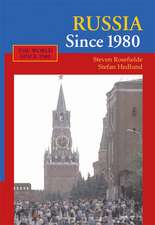Rise and Fall of Repression in Chile: Kellogg Institute Series on Democracy and Development
Autor Pablo Policzeren Limba Engleză Paperback – 14 feb 2009
In The Rise and Fall of Repression in Chile, Pablo Policzer tackles the difficult task of analyzing how authoritarian regimes utilize coercion. Even in relatively open societies, coercive institutions such as the police and military tend to be secretive and mistrustful of efforts by outsiders to oversee their operations. In more closed societies, secrecy is the norm, making coercion that much more difficult to observe and understand.
Drawing on organization theory to develop a comparative typology of coercive regimes, Policzer analyzes the structures and mechanisms of coercion in general and then shifts his focus to the early part of the military dictatorship in Chile, which lasted from 1973 to 1990. Policzer's book sheds new light on a fundamental, yet little-examined, period during the Chilean dictatorship. Between 1977 and 1978, the governing junta in Chile quietly replaced the secret police organization known as the Dirección de Informaciones Nacional (DINA) with a different institution, the Central Nacional de Informaciones (CNI). Policzer provides the first systematic account of why the DINA was created in the first place, how it became the most powerful repressive institution in the country, and why it was suddenly replaced with a different organization, one that carried out repression in a markedly more restrained manner.
Policzer shows how the dictatorship's reorganization of its security forces intersected in surprising ways with efforts by human rights watchdogs to monitor and resist the regime's coercive practices. He concludes by comparing these struggles with how dictatorships in Argentina, East Germany, and South Africa organized coercion.
“An important and well-crafted book, The Rise and Fall of Repression in Chile makes a valuable contribution to the literatures on comparative politics, authoritarian repression, democratic transitions, and recent Chilean politics. Policzer admirably succeeds in offering an original argument about the nature of authoritarian coercion while also changing our perception of the dynamics of the Pinochet regime." —Anthony W. Pereira, Tulane University
“Pablo Policzer opens up the black box of the Pinochet regime and reveals the complex internal politics surrounding how the regime used and sought to regulate repression. We know too little about the internal workings of authoritarian regimes, and Policzer's book shows us not only how principal-agent problems led to a fundamental reorganization of repression, but also the unpredictable ways in which human rights monitoring shaped struggles within the state over the management of repression. This is path-breaking work and a must-read for students of authoritarianism. “ —William Stanley, University of New Mexico
| Toate formatele și edițiile | Preț | Express |
|---|---|---|
| Paperback (1) | 216.16 lei 6-8 săpt. | |
| MR – University of Notre Dame Press – 14 feb 2009 | 216.16 lei 6-8 săpt. | |
| Hardback (1) | 589.10 lei 6-8 săpt. | |
| Wiley – 29 sep 2022 | 589.10 lei 6-8 săpt. |
Din seria Kellogg Institute Series on Democracy and Development
-
 Preț: 222.01 lei
Preț: 222.01 lei - 19%
 Preț: 450.29 lei
Preț: 450.29 lei -
 Preț: 365.21 lei
Preț: 365.21 lei -
 Preț: 277.23 lei
Preț: 277.23 lei -
 Preț: 277.53 lei
Preț: 277.53 lei -
 Preț: 173.49 lei
Preț: 173.49 lei -
 Preț: 284.82 lei
Preț: 284.82 lei -
 Preț: 299.65 lei
Preț: 299.65 lei -
 Preț: 243.30 lei
Preț: 243.30 lei -
 Preț: 279.23 lei
Preț: 279.23 lei - 27%
 Preț: 701.59 lei
Preț: 701.59 lei -
 Preț: 162.65 lei
Preț: 162.65 lei -
 Preț: 221.38 lei
Preț: 221.38 lei -
 Preț: 180.06 lei
Preț: 180.06 lei -
 Preț: 157.58 lei
Preț: 157.58 lei -
 Preț: 232.16 lei
Preț: 232.16 lei - 15%
 Preț: 456.46 lei
Preț: 456.46 lei - 23%
 Preț: 591.49 lei
Preț: 591.49 lei -
 Preț: 276.55 lei
Preț: 276.55 lei - 23%
 Preț: 588.22 lei
Preț: 588.22 lei -
 Preț: 199.49 lei
Preț: 199.49 lei - 27%
 Preț: 699.35 lei
Preț: 699.35 lei -
 Preț: 280.96 lei
Preț: 280.96 lei -
 Preț: 367.12 lei
Preț: 367.12 lei - 27%
 Preț: 697.53 lei
Preț: 697.53 lei -
 Preț: 205.64 lei
Preț: 205.64 lei -
 Preț: 464.59 lei
Preț: 464.59 lei -
 Preț: 443.72 lei
Preț: 443.72 lei -
 Preț: 243.30 lei
Preț: 243.30 lei -
 Preț: 254.37 lei
Preț: 254.37 lei -
 Preț: 324.83 lei
Preț: 324.83 lei -
 Preț: 354.99 lei
Preț: 354.99 lei -
 Preț: 200.26 lei
Preț: 200.26 lei -
 Preț: 325.43 lei
Preț: 325.43 lei -
 Preț: 177.57 lei
Preț: 177.57 lei -
 Preț: 173.91 lei
Preț: 173.91 lei -
 Preț: 275.43 lei
Preț: 275.43 lei -
 Preț: 300.58 lei
Preț: 300.58 lei -
 Preț: 252.64 lei
Preț: 252.64 lei -
 Preț: 275.40 lei
Preț: 275.40 lei -
 Preț: 244.94 lei
Preț: 244.94 lei -
 Preț: 298.67 lei
Preț: 298.67 lei -
 Preț: 156.23 lei
Preț: 156.23 lei
Preț: 216.16 lei
Nou
Puncte Express: 324
Preț estimativ în valută:
41.38€ • 43.18$ • 34.69£
41.38€ • 43.18$ • 34.69£
Carte tipărită la comandă
Livrare economică 12-26 martie
Preluare comenzi: 021 569.72.76
Specificații
ISBN-13: 9780268038359
ISBN-10: 026803835X
Pagini: 262
Dimensiuni: 152 x 228 x 17 mm
Greutate: 0.4 kg
Ediția:1st Edition
Editura: MR – University of Notre Dame Press
Seria Kellogg Institute Series on Democracy and Development
ISBN-10: 026803835X
Pagini: 262
Dimensiuni: 152 x 228 x 17 mm
Greutate: 0.4 kg
Ediția:1st Edition
Editura: MR – University of Notre Dame Press
Seria Kellogg Institute Series on Democracy and Development
Recenzii
“Acknowledging that coercion is one of the dark spaces of politics, Policzer aims to illuminate the ways in which authoritarian regimes organize their institutions, as well as the causes and consequences of their choices. . . . Policzer’s analysis casts the Pinochet dictatorship in a new light, illustrating how Pinochet faced various trade-offs in organizing his coercive apparatus.” —Choice
“This important book enriches the literature on authoritarian regimes by asking what factors and specific mechanisms explain the changes in the organization of coercion under such regimes. This is a significant book because it poses new questions and delivers new theoretical tools to explore this new region of problematization.” —Latin American Politics and Society
“. . . Repression is often understood in terms of relatively simple explanatory schemes: ideological zeal, domestic power arrangements, and international political pressure. In this new book, Pablo Policzer seeks to expose the inadequacies of such explanations and to offer an alternative approach for explaining and understanding political repression. . . . This work is original and thought-provoking, and offers a valuable contribution to the history of the Pinochet regime. It is certainly a stepping stone for new research in the field of political repression.” —Canadian Journal of Latin American & Caribbean Studies
Notă biografică
Pablo Policzer is assistant professor in political science and Canada Research Chair in Latin American Politics at the University of Calgary.











